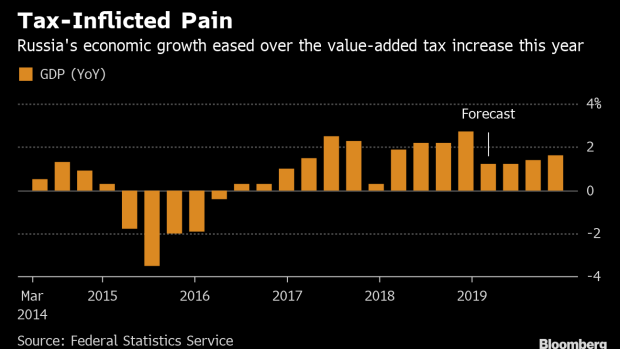May 17, 2019
Putin's 2018 Growth Spurt Proves Short-Lived as Tax Hike Hits
, Bloomberg News

(Bloomberg) -- Russian officials touted last year’s surprisingly strong growth as a sign the economy was finally getting traction, but as initial results for 2019 come in, that’s looking more like a stall.
A value-added-tax hike that took effect on Jan. 1 has been a drag on growth after helping boost the performance at the end of last year to the best since 2012. Economists say growth in the first quarter was likely the lowest in more than a year. Though disappointing for the Kremlin’s hopes for faster expansion, the weak result is likely to provide further encouragement for the central bank to resume cutting interest rates at its next meeting in June.
“The first quarter wasn’t horrible, it was just bad, most likely the central bank will cut rates by a quarter point in June,” said Anton Tabakh, the chief economist at Moscow-based credit assessor Expert Ra. “Because of the VAT hike, a lot of economic activity moved to the fourth quarter of last year.”
GDP rose 1.2% in the first quarter of this year, according to 14 economists in a Bloomberg survey, after a 2.7% jump in the last three months of 2018. The Federal Statistics Service, known as Rosstat, may release the first quarter reading as early as Friday. A weak report could also help defuse recent criticism of the agency for producing overly rosy economic data.
“Weakening wage growth has weighed on spending,” said Liza Ermolenko, an economist at Barclays in London. “We expect further weakness going forward. If anything, growth could slow more in the coming months.”
After adjusting for inflation, wages were stagnant in February and March and are forecast to have risen only 0.2% in April, according to another Bloomberg survey. Car sales fell 2.7% last month.
What Bloomberg’s Economists Say:
“The slowdown was a self-inflicted blow, with higher taxes squeezing households. But the inflation spike hasn’t been as big as we feared, and the sting should fade quickly. Rate cuts and fiscal stimulus could help fuel a swift rebound in the second half.”
--- Scott Johnson, Russia economist. Read RUSSIA PREVIEW
The Bank of Russia sees the economy expanding 1.2%-1.7% this year, citing the value-added tax increase to 20% from 18% as “a small restraining effect” and noting that planned government infrastructure spending could boost growth later this year.
But BofA Merrill Lynch Global Research warned in a report Thursday that increasing risks to global growth could also cloud the outlook for Russia next year, with 2020 growth sliding below 1% confounding hopes of an uptick.
--With assistance from Zoya Shilova.
To contact the reporter on this story: Anna Andrianova in Moscow at aandrianova@bloomberg.net
To contact the editors responsible for this story: Gregory L. White at gwhite64@bloomberg.net, Torrey Clark
©2019 Bloomberg L.P.